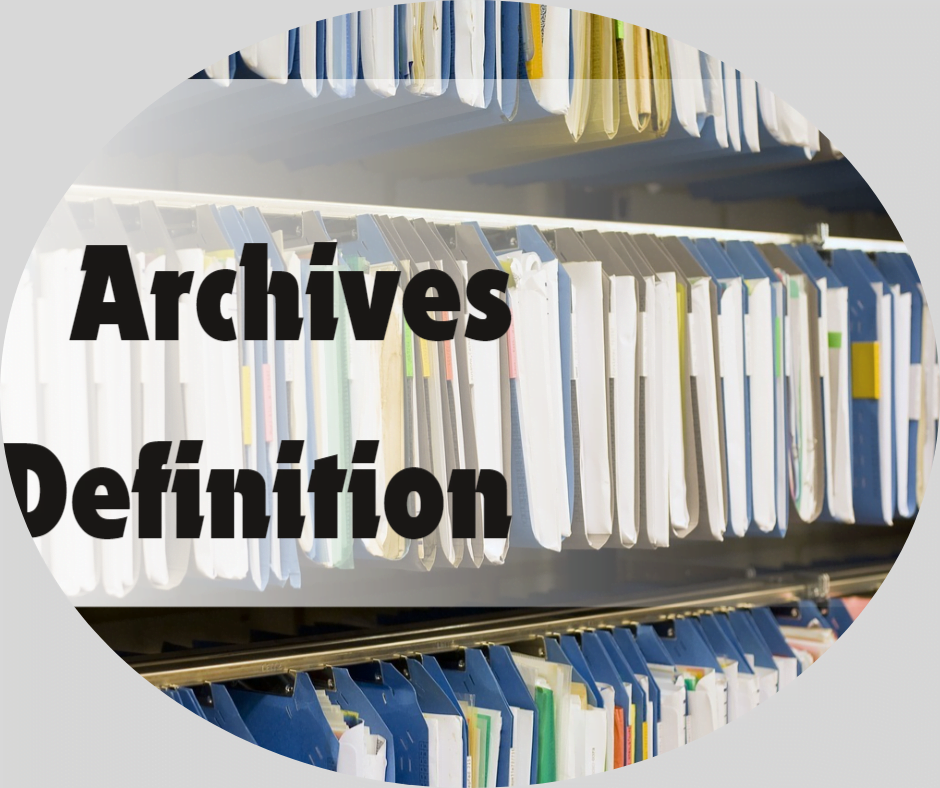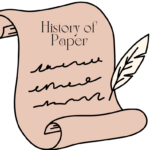The word Archives is derived from the Greek word Archeion. The word Archeion literally means office. The root of the word Archeion is Arche, meaning beginning, source, power, sovereignty, empire, magistracy, and office. In Latin, it is called Archivium. In French it is L. Archive. And in English language is Archives.
Simply put, an archive is a set of documents that are produced for use in some important work, and the activities of the organization are managed by the proper preservation of the materials, which are later used as records or documents.
Since the origin of the word Archives, it can be seen that different scholars of different countries have defined it differently from time to time. However, no similarity was found between all those definitions in terms of objectives and targets. Because Archivists of different countries have defined Archives in different ways in terms of their place, time, and needs.

Below is a discussion of the definitions of different thinkers by place and time:
Oxford English Dictionary definition
Oxford English Dictionary gives two definitions about archives viz:
1. A place in which public records or other important historical documents are kept
2. A historical record or document so preserved
Analysis:
- The definition first states that archives are places where important historical documents of the public are stored. But archives cannot be accommodated in such a small space in a practical room. Because the archive is a comprehensive thing. Its importance and scope is vast. It is not difficult to understand in one word.
- According to the second definition, Archives are documents that carry contradictory meaning that are objectionable.
Criticism:
Double Meaning:
- In light of the first definition given, archives are once said to be space and on the other hand said to be documents. Which is very important and valuable. But these two are not capable of specifying the definition of archives. Because these two objects cannot be archives. The actual building where the document is kept is called Archival Institution or Archival Building.
- Moreover, the word conveys a double meaning. The use of double meaning words is objectionable. Because such things have a real meaning. Through which there is no difficulty in understanding the name just initially.
No Purpose: There are two main purposes of creating documents and records.
- First of all, the required material should be used as a reference.
- Secondly, the materials should be used for the research needs of future researchers. This definition says nothing about this purpose.
- Producing Agency: Archives materials must be produced by the Authoritative Agency or created by the Creating agency, which have the authority to produce the Archives. Otherwise, he will not have admissibility.
Acceptance:
For the above three reasons, the definition given by Oxford English Dictionary is not accepted and reliable.
Definition of Dutch:
In the nineteenth century, three Dutch archivists gave an idea of the archive called the Dutch definition. These three archivists are:
- S. Muller(1848-1922)
- R. Fruin(1857-1935)
- J.A. Reith(1858-1913)
In their 1998 Manual for the Arrangement and Description of Archives, they define archives as saying, “The whole of the written documents, drawings, and printed matter officially received or produced by an administrative body or one of its/each official is so far as these documents were intended to remain in the custody of that body or of that official.”.
Analysis:
According to the Dutch definition, archives mean:
- It includes all types of written documents, drawings, and printing that are obtained from office sources.
- That is produced by administrative agencies and their employees.
- All those documents are kept in the custody of the employees of that organization.
Criticism:
First: In the light of the definition, archives have been undermined by putting them in a very broad category. Paintings and printed materials cannot be Archives material.
Second: Those documents that are created by the staff of several offices but are not used for research reference are not archives.
Third: Archives must have a clear financial purpose for creating their material. In the said definition, there is no clear idea of what purpose Archives material will be created.
Fourth: Nothing is said in this definition about why and for what purpose archives will be created or preserved.
Acceptance: The dust definition is not acceptable due to the defects noted in the above discussion.
Italian Definition:
In 1928, the Italian Archivist Engerio Caranov said about the archive, “Archive is a systematic collection of documents created by an organization or individual that is preserved for political, legal, constitutional, and cultural purposes. This definition can be observed by analyzing the following characteristics:.
Analysis:
- Individuals create documents.
- They are preserved.
- Documents are preserved as political, legal, and cultural precedents.
Criticism:
The definition has a very narrow concept of archives. That is, it fails to give any proper direction; therefore the definition is unacceptable. Because nothing has been clearly said about whether the documents are created officially or non-officially. So this statement is also weak.
British definition:
British archivist Sir Hilary Genkinson, in his 1937 book “A Manual of Archive Administration,” defined archives as:
“A document that may be said to belong to the class of Archives is one that was drawn up or used in the course of an administrative or executive transaction (whether public or private) of which itself formed a part and subsequently preserved in its own custody for their information by the persons and persons responsible for that transaction and their legitimate successors.”
Analysis:
- Archives are created to preserve executive and administrative communications.
- Archive material should be created either publicly or privately.
- shall be under or under the supervision of the manufacturers.
- The construction company/organization is limited to providing information only to them or their successors.
Criticism:
- According to Jenkinson, archives are created in the context of official activities and are maintained to solve problems on a large scale. But archives are government preserves, not private preserves.
- He greatly limited the power of the Archives. Jenkinson is well-known as an archivist; here he plays only the role of a keeper.
- Archives materials produced by public/private organizations, if they can save someone from a big problem, are also archive materials. The view that no one can use documents/records except for their own needs is very narrow-minded. Researchers can use archives materials wherever needed, i.e., for research and reference.
Eligibility:
Although the definition given by Jenkinson is somewhat modern but the purpose of the definition is not clear and precise, so the definition is not acceptable.
American definition:
In 1956, Archivist of America T. R. Schellenberg gave a modern, logical and important definition of archives. Its definition is as follows:
“Those records of any public are private institutions which are adjudged worthy of permanent preservation for reference and recharge purposes and which have been deposited or have been selected for deposit in an archival institution.”
Analysis:
- Archives are records of public or private institutions.
- Worthy of permanent preservation.
- For future research and use as a reference.
- Archived in an archival institution or selected for preservation.
Acceptance:
- The definition is original research material.
- According to him, the archives are full of elements killed in it.
- No other definition has discussed the characteristics of material creation, storage, use, user, etc. so neatly. Which is discussed in Schellenberg’s definition.
- The definition is up-to-date.
Which definition is most acceptable and why?
Based on the definitions mentioned earlier, the Schellenberg definition of the American Archives TR is more acceptable. This is because the definition incorporates modern rationality, significance, acceptability, and suggestibility. Therefore, this definition can be readily embraced. However, there are two objectives of the national administration of a country. For proper administration, necessary measures must be taken for the proper management of documents from various government departments, ministries, and other subordinate offices. Furthermore, the need for higher education outweighs the role played by individual knowledge acquisition.



